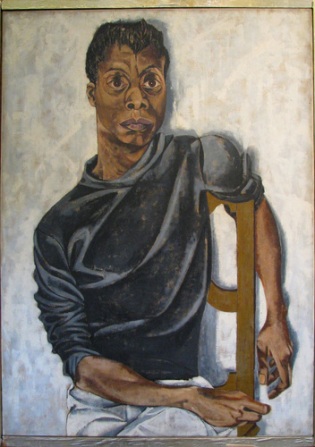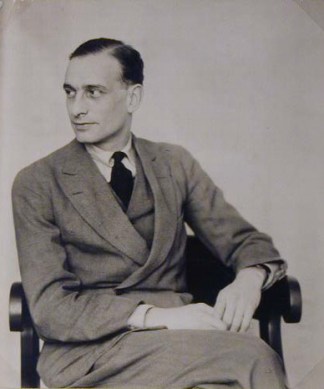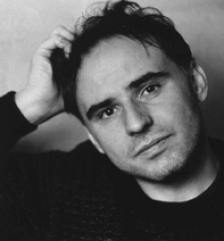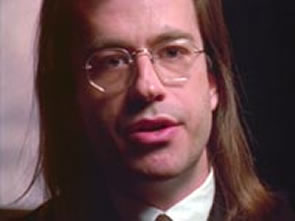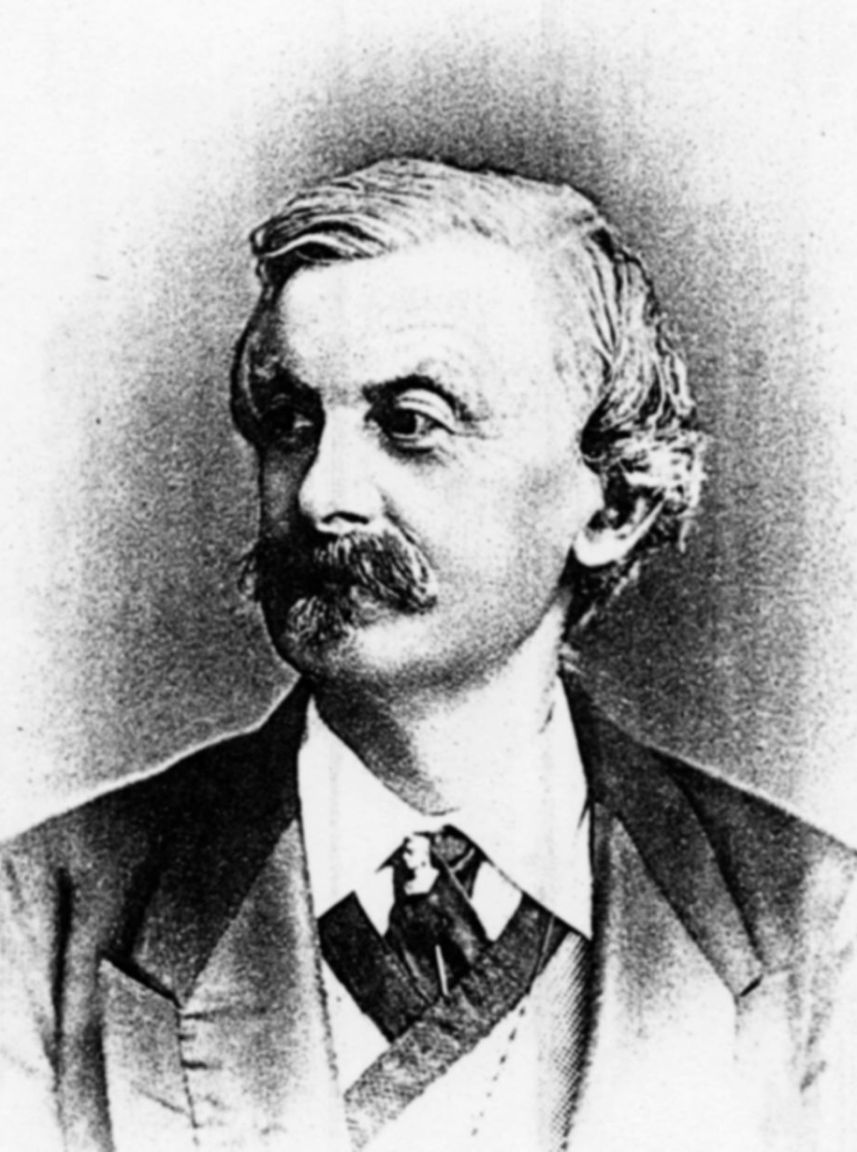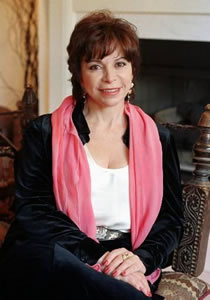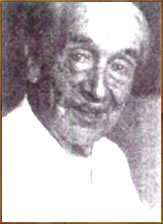De Chileense schrijfster Isabel Allende werd geboren in Lima op 2 augustus 1942. Zie ook mijn blog van 2 augustus 2007 en ook mijn blog van 2 augustus 2008 en ook mijn blog van 2 augustus 2009.
Uit: Het eiland onder de zee (Vertaald door Rikkie Degenaar)
“Toulouse Valmorain kwam aan in Saint-Domingue in 1770, het jaar dat de Franse dauphin met de Oostenrijkse aartshertogin Marie-Antoinette trouwde. Voor hij naar de kolonie afreisde, toen hij er nog geen idee van had dat het lot hem een loer zou draaien en hij zich uiteindelijk tussen de suikerrietvelden van de Antillen zou begraven, was hij in Versailles nog uitgenodigd op een van de feesten ter ere van de nieuwe dauphine; een veertienjarig, blond meisje dat onverholen zat te gapen vanwege het strenge protocol van het Franse hof.
Dat lag allemaal achter hem. Saint-Domingue was een andere wereld. De jonge Valmorain had niet meer dan een vaag idee van de plek waar zijn vader zo goed en zo kwaad als het ging het geld bijeengaarde om zijn gezin te onderhouden, met de ambitie er een fortuin van te maken. Hij had ergens gelezen dat de Arowakken, de oorspronkelijke indiaanse bewoners, het eiland ‘Haïti’ hadden genoemd voor de conquistadores de naam in ‘La Española’ veranderden en met alle inboorlingen afrekenden.
Binnen vijftig jaar was er niet één Arowak over en waren al hun sporen uitgewist: ze bezweken aan Europese ziekten, pleegden zelfmoord of vielen ten slachtoffer aan de slavernij. Het was een ras met een rossige huid en dik zwart haar, van een onbewogen waardigheid en zo zachtaardig dat een Spanjaard er op zijn eentje en met zijn blote handen wel tien tegelijk aankon. Ze leefden in polygame gemeenschappen en bewerkten de aarde met zorg, om haar niet uit te putten: zoete aardappelen, maïs, kalebassen, aardnoten, paprika, aardappelen en maniok.“
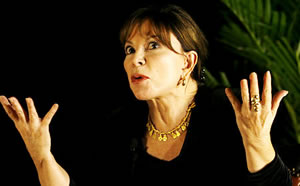
Isabel Allende (Lima, 2 augustus 1942)
De Amerikaanse schrijver James Baldwin werd op 2 augustus 1924 in Harlem, New York, geboren. Zie ook mijn blog van 2 augustus 2006 en ook mijn blog van 2 augustus 2007 en ook mijn blog van 2 augustus 2008 en ook mijn blog van 2 augustus 2009.
Uit: Sonny’s Blues
„All I know about music is that not many people ever really hear it. And even then, on the rare occasions when something opens within, and the music enters, what we mainly hear, or hear corroborated, are personal, private, vanishing evocations. But the man who creates the music is hearing something else, is dealing with the roar rising from the void and imposing order on it as it hits the air. What is evoked in him, then, is of another order, more terrible because it has no words, and triumphant, too, for that same reason. And his triumph, when he triumphs, is ours. I just watched Sonny’s face. His face was troubled, he was working hard, but he wasn’t with it. And I had the feeling that, in a way, everyone on the bandstand was waiting for him, both waiting for him and pushing him along. But as I began to watch Creole, I realized that it was Creole who held them all back. He had them on a short rein. Up there, keeping the beat with his whole body, wailing on the fiddle, with his eyes half closed, he was listening to everything, but he was listening to Sonny. He was having a dialogue with Sonny. He wanted Sonny to leave the shoreline and strike out for the deep water. He was Sonny’s witness that deep water and drowning were not the same thing — he had been there, and he knew. And he wanted Sonny to know. He was waiting for Sonny to do the things on the keys which would let Creole know that Sonny was in the water.
And, while Creole listened, Sonny moved, deep within, exactly like someone in torment. I had never before thought of how awful the relationship must be between the musician and his instrument. He has to fill it, this instrument, with the breath of life, his own. He has to make it do what he wants it to do. And a piano is just a piano. It’s made out of so much wood and wires and little hammers and big ones, and ivory. While there’s only so much you can do with it, the only way to find this out is to try; to try and make it do everything.“
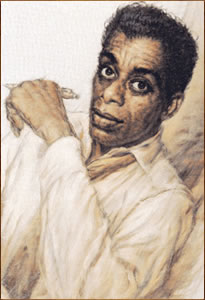
James Baldwin (2 augustus 1924 – 1 december 1987)
De Hongaarse dichter en schrijver Zoltán Egressy werd geboren in Boedapest op 2 augustus 1967. Zie ook mijn blog van 2 augustus 2008 en ook mijn blog van 2 augustus 2009.
Uit: Sports the Hungarians do badly (Bespreking van Spinach and Chips door Patrick Mullowney)
„Here, there is no ensemble cast, just three characters: two line-guards and a referee in the changing room before, during, and after a local soccer match. Here we find the same exaggerated human foibles –stupidity, vanity, alcoholism, etc. – that were on display in Portugal. These grotesque figures are also depicted in a gently indulgent way. The novelty here is the sports-talk and soccer jargon, which the characters handle naturally and effortlessly, giving us a very unlikely behind-the-scenes view of the game. The fact that we get an intimate peek at the lives of these mostly overlooked (if not mocked and despised) soccer employees gives the play its special appeal. (Egressy wrote another sports play entitled 4 x 100 about a women’s relay team. Although seemingly a female version of Spinach and Chips with many similar themes, this play focused instead on the athletes and coaches. It ran for a short time at the Merlin Theatre and prompted critic Andrea Tompa to ask, “Why does Egressy always choose sports that the Hungarians do badly?”)
(…)
As for the scenario, Soap and Artist are the two unhappy line guards. Soap is still angry about being demoted from referee. Artist has lost his girlfriend Mariann, who always used to give him spinach and chips before each match. She left him for Laci, the referee for that day’s match. Artist deals with the loss by drinking vast quantities of alcohol and writing awful poetry. Since both men, justly or unjustly, blame Laci for their misfortunes, they decide to sabotage the game to get revenge.“
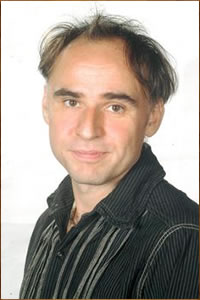
Zoltán Egressy (Boedapest, 2 augustus 1967)
De Amerikaanse schrijver en historicus Caleb Carr werd geboren op 2 augustus 1955 in New York. Zie ook mijn blog van 2 augustus 2008. en ook mijn blog van 2 augustus 2009.
Uit: The Alienist
„I have to confess – I remember almost nothing about this book – which I find weird, because I remember loving it when I first read it!
I read this book when it first came out, although it’s not really my thing. Actually, it is my thing – with the whole historical New York setting, which I love – and the serial killer plotline – which I love even more. I love any book about the psychology of killers (having just finished 2 books in a row on Leopold & Loeb … the theme continues) But it was one of those moments when you look around on the subway and you see EVERYONE reading the same book … and in general, I don’t read books like that. Not that I have anything against them, morally or whatever – but if everyone’s reading it, I probably will not be into it myself. At any given moment you can look around and see people reading Nicholas Sparks. Or Mitch Albom. I’m not reading those people. But they’re obviously massive bestselling authors – which is why you look around and see everyone reading their books – but I am not their audience. Just not. There have been a couple of times when my taste coincided with the zeitgeist moment – and The Alienist was one of them. I can’t remember why I picked it up – because i’m usually turned off by 100% agreement, as in: a neverending chorus of “you have to read this book!” What can I say. I’m contrary. The weird thing is, though, I can remember my experience of reading The Alienist (I could not put that book down. Total page-turner) – but I can remember almost nothing about it. I know there was a group of people who came together to solve the crime.“
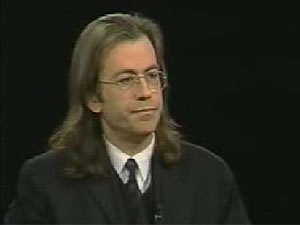
Caleb Carr (New York, 2 augustus 1955)
De Franse dichter en schrijver Philippe Soupault werd geboren op 2 augustus 1897 in Chaville bij Parijs. Zie ook mijn blog van 2 augustus 2007 en ook mijn blog van 2 augustus 2008 en ook mijn blog van 2 augustus 2009.
Pour la liberté
Laissez chanter
l’eau qui chante
Laissez courir
l’eau qui court
Laissez vivre
l’eau qui vit
l’eau qui bondit
l’eau qui jaillit
Laissez dormir
l’eau qui dort
Laissez mourir
l’eau qui meurt.
Donnez-moi
Donnez-moi je vous prie
Vos ciseaux
Vos couteaux
Vos sabots
Vos bateaux
Donnez-moi tout je vous prie
Je rémoule et je scie
Donnez-moi je vous prie
Vos cisailles
Vos tenailles
Vos ferrailles
Vos canailles
Donnez-moi tout je vous prie
Je rémoule et je scie
Donnez-moi je vous prie
Vos fusils
Vos habits
Vos tapis
Vos ennuis
Je rémoule et je fuis.
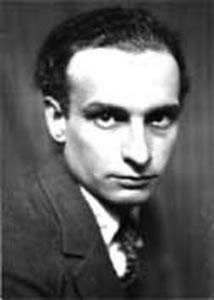
Philippe Soupault (2 augustus 1897 – 12 maart 1990)
De Frans-Canadese dichter, schrijver, acteur, zanger en politiek activist Félix Leclerc werd geboren op 2 augustus 1914 in La Tuque, Quebec, Canada. Zie ook mijn blog van 2 augustus 2007.
Prière bohémienne
À tous les bohémiens, les bohémiennes de ma rue
Qui sont pas musiciens, ni comédiens, ni clowns
Ni danseurs, ni chanteurs, ni voyageurs, ni rien
Qui vont chaque matin, bravement, proprement
Dans leur petit manteau sous leur petit chapeau
Gagner en employés le pain quotidien
Qui sourient aux voisins sans en avoir envie
Qui ont pris le parti d’espérer
Sans jamais voir de l’or dans l’aube ou dans leur poche
Les braves Bohémiens, sans roulotte, ni chien
Silencieux fonctionnaires aux yeux fatigués
J’apporte les hommages émus
Les espoirs des villes inconnues
L’entrée au paradis perdu
Par des continents jamais vus
Ce sont eux qui sont les plus forts
Qui emportent tout dans la mort
Devant ces bohémiens, ces bohémiennes de ma rue
Qui n’ont plus que la nuit pour partir
Sur les navires bleus de leur jeunesse enfuie
Glorieux oubliés, talents abandonnés
Comme des sacs tombés au bord des grands chemins
Qui se lèvent le main cruellement heureux
D’avoir à traverser des journées
Ensoleillées, usées, où rien n’arrivera que d’autres embarras
Que d’autres déceptions tout au long des saisons
J’ai le chapeau bas à la main
Devant mes frères bohémiens
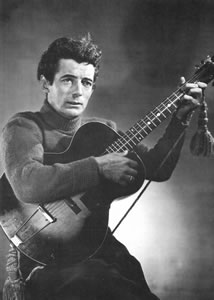
Félix Leclerc (2 augustus 1914 – 8 augustus 1988)
Leclerc in 1950
De Zwitserse schrijver Arnold Kübler werd geboren op 2 augustus 1890 in Wiesendrangen. Zie ook mijn blog van 2 augustus 2007.
Uit: Der verhinderte Schauspieler
„Mitten in den Ferien noch packte er seinen Koffer und machte sich auf nach Örlewitz. Es war die Zeit nach dem Großen Krieg. Noch wuchs kein Gräslein auf den Feldern, darüber er weggezogen. Noch versuchten rings um Helvetien in allen Krankenhäusern die Ärzte mit seiner Hinterlassenschaft fertig zu werden, noch klangen den Menschen die Drahtnachrichten der Heeresleiter im Ohr und der Ton der Kriegsberichterstatter, die sie jahrelang vernommen. Aber jenseits des Bodensees hingen die Äpfel an den Bäumen wie daheim, daß Drahtzaun sich wunderte, und als er nachts durch Bayern und Franken fuhr und der Vollmond auf den Feldern lag und auf die Dächer schien, darunter die Menschen schliefen, die im Kriege gewesen, während er den Esel im Weihnachtsmärchen gespielt hatte, da schämte sich Drahtzaun jetzt, dahinein zu dringen, wo er bisher nicht gewesen, und es war ihm, als dürfe er nur ganz bescheiden auftreten und sozusagen auf den Zehenspitzen das fremde Land betreten. – In Dresden nahm er ein Bad und wusch sich mit Kriegsseife, die kein Fett, aber viel Lehm enthielt und die ihm ein Fräulein lächelnd durch den Schalter gereicht hatte. Am andern Tag setzte er die Reise nach Örlewitz fort. – Das Land lag eben, weite Stoppelfelder zogen an den Fenstern vorbei; die Wälder sahen anders aus als jene, drin Drahtzaun Erdbeeren gesucht hatte, und in den Zeitungen standen lauter fremde Dinge. In Örlewitz stand auf dem Bahnhofplatz ein Festbogen mit Tannenreisig umwunden und mit der Aufschrift »Willkommen« geschmückt. Der galt aber nicht ihm, sondern den heimkehrenden Kriegsgefangenen. Im Hotel ließ er sich sofort einen Lindenblütentee geben. Den goß er glühendheiß durch seine Kehle, nicht wegen des Durstes, sondern wegen der Stimme. Die lange Reise war ihm nicht gut bekommen, das hatte er gleich gemerkt, vorhin, als er das Zimmer bestellte!“

Arnold Kübler (2 augustus 1890 – 27 december 1983)
Getekend door Martin Fivian
De Duitse dichter, schrijver, kunst- en literatuurcriticus Adolf Friedrich von Schack werd geboren op 2 augustus 1815 in Brüsewitz bij Schwerin. Zie ook mijn blog van 2 augustus 2007 en ook mijn blog van 2 augustus 2008.
Oft, wenn wir ruhen Mund an Mund
Oft, wenn wir ruhen Mund an Mund
Und meine Adern an den deinen pochen,
Nach innen lausch’ ich plötzlich still;
Ich fühle, wie aus unsrer Seele Grund
Ein Wort, noch nie auf Erden ausgesprochen,
Empor sich ringen will.
O! der Natur Geheimniß ruht
Und alles Lebens in dem Wort beschlossen,
Doch matt bisher noch ists verhallt.
Höher aufflammen laß der Küsse Gluth,
Daß es zuletzt, in vollen Klang ergossen,
Von unsern Lippen wallt!
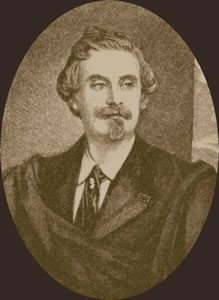
Adolf Friedrich von Schack (2 augustus 1815 – 14 april 1894)







